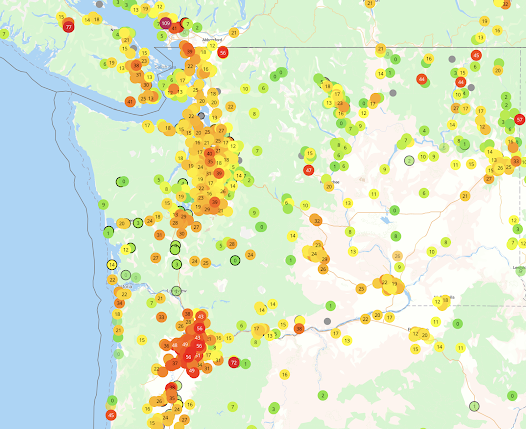Smoke Plume from the Bolt Fire Invades Western Washington
A narrow plume of relatively dense smoke from the Bolt fire has been pushing into western Washington the last few days.
And today may be the worst of the period.
The 11 AM surface air quality network run by Purple Air shows the smoky air (red colors are the worst) moving westward out from Steven Pass highway into Everett and north Seattle. I can smell the smoke here at the UW.
The high-resolution visible satellite image this morning clearly shows the plume of smoke following through the relatively narrow Skykomish River valley and spreading out as it hits the lowlands.
Although not spread horizontally, the Bolt Fire is still smoldering and burning internally, producing significant smoke, as evident from WSDOT cams on Route 2.
The meteorology is interesting.
Cool air produced by the longer nights drains into river valleys (like the Skykomish) and then jets out into the lowlands, injecting the smoke into populated areas each morning (see plots of the amount of particles in the air above Monroe, WA the past few days). Later in the afternoon, increasing mixing by convective mixing (produced by surface heating) tends to dilute the smoke concentrations.
The meteorological "problem" is that we have a very weak pressure pattern over us right now, with little clean, onshore flow (see weather map for this AM, showing sea level pressure).
Tuesday won't be much better, but the pressure pattern should change on Wednesday afternoon, with much more onshore and northwesterly flow moving in.










Comments
Post a Comment